Organic Society
 |
 |
 |
 |
 |
 |
 |
Medieval Written Law - IV
Contractual Rights & Duties in the Fief
Regarding the topic we analyzed in the last article – the healthy turbulence that existed in medieval society – it is interesting to recall the teaching of Pius XII. He said that the Church is the Master of all nations not only because she teaches the true doctrine, but also because she is so well organized that anything that wants to be well arranged should look at her to learn how to organize itself.
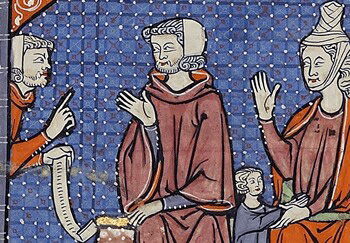 Now then, inside the Church, we find something similar to what we saw in medieval society. We find determined rights that are so radical and decisive that even the Pope cannot change them. For instance, the existence of Bishops in the Church cannot be changed by a Pope because it is of divine institution. The same can be said of the seven Sacraments, also of divine institution. The infallibility of the Papacy is on the same level.
Now then, inside the Church, we find something similar to what we saw in medieval society. We find determined rights that are so radical and decisive that even the Pope cannot change them. For instance, the existence of Bishops in the Church cannot be changed by a Pope because it is of divine institution. The same can be said of the seven Sacraments, also of divine institution. The infallibility of the Papacy is on the same level.
These are rights so fundamental that anyone has the right to react to defend them. It can happen that a high Prelate wants to oppress a lower Prelate by giving him orders that he has no right to give. The lower Prelate has the right to defend himself.
He can simply answer: “No, I will not obey your orders because I have the divine right to govern this territory. Above me there is only the Pope. Although I respect your authority, in what concerns my Diocese I will not follow your orientation.” Here we finds a foundation similar to the one we saw in medieval society.
Originality of a society based on contracts
The contractual character that existed in the medieval organization involved certain dangers, but without it a society suffers still greater risks. This contractual organization is usually ignored by commentators on medieval society, but, in my opinion, it is one of the most original characteristics of the Middle Ages.
Those contractual rights were still alive until the French Revolution. When the revolutionary government started to alter the juridical organization of France, for example in Brittany, violating what was written in the old contract by which Brittany decided to incorporate itself to the French Crown, this set off violent reactions.
What did the Britain nobility do? The nobles met and sent a threat to the central government: “If you continue on this road, we will proclaim the independence of Brittany. We had a contract; you are violating it; therefore, its terms will become void.”
What was France in the Ancien Regime? It was a multitude of regions based on such contracts. When the revolutionaries murdered the King, faithful France stood up: Three quarters of the French departments took up arms because their contracts were violated. You can see how the notion of a society based upon contracts was still alive.
Rights of the feudal lord over the vassals & vice-versa
Having said this, let us return to the fief. What was the nature of the organization of a fief? What rights did a feudal lord have over his vassals and his suzerain? How did he make his laws?
A feudal lord had three types of subordinates: the noble vassals, those we could call renters who had provisory rights over determined lands, and the population of the free men.
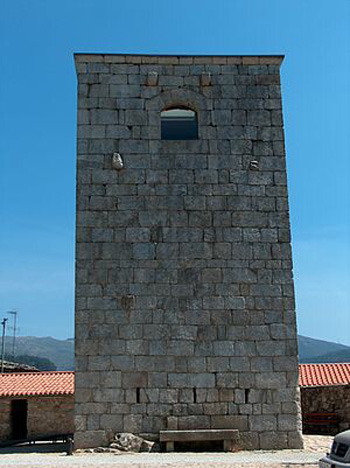 If we consider the fief a territory in the rectangular form of this table, and the feudal lord’s central seat is where the microphone sets, then we can understand that, because of the medieval turbulence, the lord's enemies could enter his territory anywhere along the borders of the table. So, just as the King had made him a lord of those lands to defend them against the King’s enemies, he would install along the borders of his territory smaller feudal lords, who would build their castles there in order to defend the borders of his territory.
If we consider the fief a territory in the rectangular form of this table, and the feudal lord’s central seat is where the microphone sets, then we can understand that, because of the medieval turbulence, the lord's enemies could enter his territory anywhere along the borders of the table. So, just as the King had made him a lord of those lands to defend them against the King’s enemies, he would install along the borders of his territory smaller feudal lords, who would build their castles there in order to defend the borders of his territory.
Then, he would use the central part of the fief to farm the lands, since the whole border was defended by the castles of the feudal lords he had constituted. If some parts of these smaller fiefs needed to be better defended, the smaller feudal lord would repeat the process and constitute another lower rank of nobles.
At times, some of these secondary lesser nobles would not build a castle, but just a tower that would be used to watch the land and a stronghold for his people to defend themselves in the case of an attack.
All these noble vassals were obliged to defend their suzerain in case of necessity.
In addition, there were the plebeian vassals. These could be of two orders:
First, there were those who received the lands they would manage from the lord by means of a contract and then pay an annual or monthly tribute. The parties would make a contract similar to the emphyteusis (long term lease) in our Brazilian Law. Those plebeian subordinates, unlike the lesser feudal lords, did not have right to participate in the government of the fief.
Second, there were the servants who assisted the feudal lords either in their castles or on their lands. They also had rights and duties.
Further, there was the population of freemen, which was often a transitory population in the Middle Ages. It was a paradox, but even though the roads were often very bad in those times, the medieval man travelled a lot. In fact, there was an inexplicable travelling fury. Foreign people could be found everywhere.
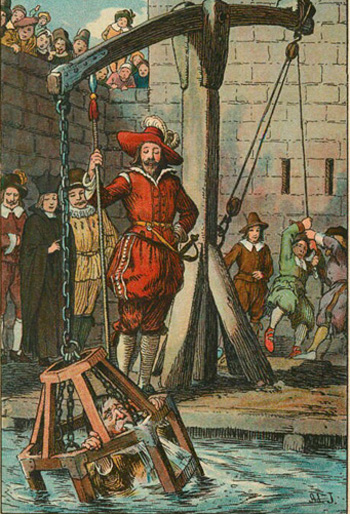
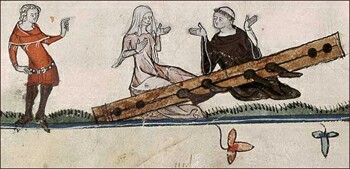 The curious thing is that there were nations that at determined times could be found all over Europe. Naturally, one of these nations was made up of Jews, who were everywhere. Another nation that travelled a lot was the Lombard nation; at a certain time Lombardians could be found in every region of Europe. These people were called vagrant, ambulatory people who were always going here and there.
The curious thing is that there were nations that at determined times could be found all over Europe. Naturally, one of these nations was made up of Jews, who were everywhere. Another nation that travelled a lot was the Lombard nation; at a certain time Lombardians could be found in every region of Europe. These people were called vagrant, ambulatory people who were always going here and there.
In the fief, the feudal lord had what was generically called the right of justice, of administration and of policing (watching over the public order). Those ambulatory men did not play a role in making laws. They lived according to natural law and their customs, which would regulate everything among those of their nation. The feudal lord would maintain them under the general rule of justice.
The lord also had the right to police his land. That is, when someone would violate the Law of God or a regional custom, he could send guards to take him to jail or apply the customary picturesque punishments. These could vary from being exposed on the pillory for a certain amount of time, to having a certain number of rotten eggs thrown at him by the village people, or having to wear a fake pig head and walk through the streets receiving the jeers of the inhabitants, etc. Crimes against honor were generally punished with penalties involving infamy.
The feudal lord also had the right of administration. In order to govern the fief well, he had the right to have his orders obeyed. Could these orders be called laws? We need to differentiate here between the smaller and larger fiefs.
When the lord had a very small fief, nothing was written down. The lord would send a herald through the city who would call out to the people: “Today is the day to repair the wall of the castle.” And the people would carry out that order. When the fief was larger, the lord would write out the order and it would take the form of a law. This would be equivalent to one of today’s municipal laws inside a federation of States.
Different types of military service
Finally, there was the question of the military service. In the Middle Ages the military service was very unpopular among the plebeians, and they did not hide their displeasure over it. Those who were obliged to make military service considered it shameful and would do everything possible to escape it.
Customs established three types of military services: the service of the nobles, that of the plebeians and a general mobilization, which would include every able man in the fief.
The noble was obliged to engage in military service. The first type of obligatory service was the expedition. When a lord decided to make an incursion into the lands of a neighboring noble, he would convene his nobles and say: “Let us ride on that place.”
The second type of service was the campaign, where the noble would remain for some time in another land. Third, there was the duty of guarding the fief. In peaceful times, the vassal lords were obliged to provide the necessary guard for the castle to assist in a general defense against a surprise attack.
In parallel, there was the plebeian military service, which was a subsidiary service. It was required only when there were not enough nobles to guarantee the safety of the fief, and even in these circumstances it was very limited.
The plebeians would only serve for a certain number of prescribed days of the year and they were only required to offer that service within a certain distance from the castle. When the expedition crossed those limits, they would drop their weapons and return to their houses. This also was a strictly contractual service.
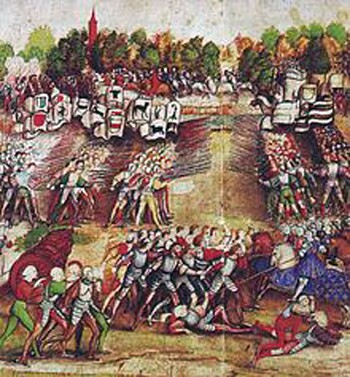 In some fiefs the feudal lords would make contracts with the rich plebeians. The bourgeois would agree to give the lord money to pay for mercenary troops to combat in their places. Often the lord would prefer to contract fierce bandits from the mountains of Switzerland to fight for him rather than have fat pacifist plebeians as companions in combat.
In some fiefs the feudal lords would make contracts with the rich plebeians. The bourgeois would agree to give the lord money to pay for mercenary troops to combat in their places. Often the lord would prefer to contract fierce bandits from the mountains of Switzerland to fight for him rather than have fat pacifist plebeians as companions in combat.
Thus, the agreement would be made and a contract written: The wealthy plebeians would pay a fee and their military service was canceled.
When the King or the feudal noble was expecting or planning a massive invasion, he would decree a general mobilization, which meant that everyone should go to war with the weapons he could muster. Enormous armies would be formed called kitchen armies because, in the absence of proper weaponry, many would arm themselves with kitchen utensils. And, when the moment of the impact between the armies would take place, there would be sword against sword, spear against spear, but also pan against pan.
This medieval mobilization was the last vestige of the old Roman mobilization, which, incidentally, was according to natural law.


The medieval man knew his rights and duties perfectly
These are rights so fundamental that anyone has the right to react to defend them. It can happen that a high Prelate wants to oppress a lower Prelate by giving him orders that he has no right to give. The lower Prelate has the right to defend himself.
He can simply answer: “No, I will not obey your orders because I have the divine right to govern this territory. Above me there is only the Pope. Although I respect your authority, in what concerns my Diocese I will not follow your orientation.” Here we finds a foundation similar to the one we saw in medieval society.
Originality of a society based on contracts
The contractual character that existed in the medieval organization involved certain dangers, but without it a society suffers still greater risks. This contractual organization is usually ignored by commentators on medieval society, but, in my opinion, it is one of the most original characteristics of the Middle Ages.
Those contractual rights were still alive until the French Revolution. When the revolutionary government started to alter the juridical organization of France, for example in Brittany, violating what was written in the old contract by which Brittany decided to incorporate itself to the French Crown, this set off violent reactions.
What did the Britain nobility do? The nobles met and sent a threat to the central government: “If you continue on this road, we will proclaim the independence of Brittany. We had a contract; you are violating it; therefore, its terms will become void.”
What was France in the Ancien Regime? It was a multitude of regions based on such contracts. When the revolutionaries murdered the King, faithful France stood up: Three quarters of the French departments took up arms because their contracts were violated. You can see how the notion of a society based upon contracts was still alive.
Rights of the feudal lord over the vassals & vice-versa
Having said this, let us return to the fief. What was the nature of the organization of a fief? What rights did a feudal lord have over his vassals and his suzerain? How did he make his laws?
A feudal lord had three types of subordinates: the noble vassals, those we could call renters who had provisory rights over determined lands, and the population of the free men.

At times the noble had only a tower to watch over his lands & protect his people - Tower of Alcofra, Portugal
Then, he would use the central part of the fief to farm the lands, since the whole border was defended by the castles of the feudal lords he had constituted. If some parts of these smaller fiefs needed to be better defended, the smaller feudal lord would repeat the process and constitute another lower rank of nobles.
At times, some of these secondary lesser nobles would not build a castle, but just a tower that would be used to watch the land and a stronghold for his people to defend themselves in the case of an attack.
All these noble vassals were obliged to defend their suzerain in case of necessity.
In addition, there were the plebeian vassals. These could be of two orders:
First, there were those who received the lands they would manage from the lord by means of a contract and then pay an annual or monthly tribute. The parties would make a contract similar to the emphyteusis (long term lease) in our Brazilian Law. Those plebeian subordinates, unlike the lesser feudal lords, did not have right to participate in the government of the fief.
Second, there were the servants who assisted the feudal lords either in their castles or on their lands. They also had rights and duties.
Further, there was the population of freemen, which was often a transitory population in the Middle Ages. It was a paradox, but even though the roads were often very bad in those times, the medieval man travelled a lot. In fact, there was an inexplicable travelling fury. Foreign people could be found everywhere.

Above, a baker being punished because he falsified the weight of the bread he sold; below, a monk caught with his lover was put on the pillory for public infamy

In the fief, the feudal lord had what was generically called the right of justice, of administration and of policing (watching over the public order). Those ambulatory men did not play a role in making laws. They lived according to natural law and their customs, which would regulate everything among those of their nation. The feudal lord would maintain them under the general rule of justice.
The lord also had the right to police his land. That is, when someone would violate the Law of God or a regional custom, he could send guards to take him to jail or apply the customary picturesque punishments. These could vary from being exposed on the pillory for a certain amount of time, to having a certain number of rotten eggs thrown at him by the village people, or having to wear a fake pig head and walk through the streets receiving the jeers of the inhabitants, etc. Crimes against honor were generally punished with penalties involving infamy.
The feudal lord also had the right of administration. In order to govern the fief well, he had the right to have his orders obeyed. Could these orders be called laws? We need to differentiate here between the smaller and larger fiefs.
When the lord had a very small fief, nothing was written down. The lord would send a herald through the city who would call out to the people: “Today is the day to repair the wall of the castle.” And the people would carry out that order. When the fief was larger, the lord would write out the order and it would take the form of a law. This would be equivalent to one of today’s municipal laws inside a federation of States.
Different types of military service
Finally, there was the question of the military service. In the Middle Ages the military service was very unpopular among the plebeians, and they did not hide their displeasure over it. Those who were obliged to make military service considered it shameful and would do everything possible to escape it.
Customs established three types of military services: the service of the nobles, that of the plebeians and a general mobilization, which would include every able man in the fief.
The noble was obliged to engage in military service. The first type of obligatory service was the expedition. When a lord decided to make an incursion into the lands of a neighboring noble, he would convene his nobles and say: “Let us ride on that place.”
The second type of service was the campaign, where the noble would remain for some time in another land. Third, there was the duty of guarding the fief. In peaceful times, the vassal lords were obliged to provide the necessary guard for the castle to assist in a general defense against a surprise attack.
In parallel, there was the plebeian military service, which was a subsidiary service. It was required only when there were not enough nobles to guarantee the safety of the fief, and even in these circumstances it was very limited.
The plebeians would only serve for a certain number of prescribed days of the year and they were only required to offer that service within a certain distance from the castle. When the expedition crossed those limits, they would drop their weapons and return to their houses. This also was a strictly contractual service.

In the foreground of this battle we see unarmed plebeians punching the enemies who fall from their horses
Thus, the agreement would be made and a contract written: The wealthy plebeians would pay a fee and their military service was canceled.
When the King or the feudal noble was expecting or planning a massive invasion, he would decree a general mobilization, which meant that everyone should go to war with the weapons he could muster. Enormous armies would be formed called kitchen armies because, in the absence of proper weaponry, many would arm themselves with kitchen utensils. And, when the moment of the impact between the armies would take place, there would be sword against sword, spear against spear, but also pan against pan.
This medieval mobilization was the last vestige of the old Roman mobilization, which, incidentally, was according to natural law.

Posted March 2, 2015
Organic Society was a theme dear to the late Prof. Plinio Corrêa de Oliveira. He addressed this topic on countless occasions during his life - at times in lectures for the formation of his disciples, at times in meetings with friends who gathered to study the social aspects and history of Christendom, at times just in passing.
Prof. Plinio
Atila S. Guimarães selected excerpts of these lectures and conversations from the transcripts of tapes and his own personal notes. He translated and adapted them into articles for the TIA website. In these texts fidelity to the original ideas and words is kept as much as possible.
______________________
______________________












